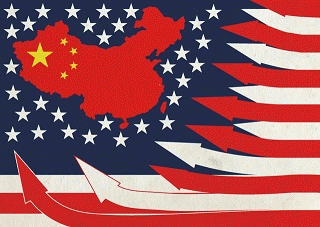From Telesur
The greatest build-up of American-led military forces since the Second World War is well underway.
When I first went to Hiroshima in 1967, the shadow on the steps was still there. It was an almost perfect impression of a human being at ease: legs splayed, back bent, one hand by her side as she sat waiting for a bank to open. At a quarter past eight on the morning of 6 August, 1945, she and her silhouette were burned into the granite. I stared at the shadow for an hour or more, unforgettably. When I returned many years later, it was gone: taken away, "disappeared," a political embarrassment.
The great danger this beckons is not news, or it is buried and distorted: a drumbeat of mainstream fake news that echoes the psychopathic fear embedded in public consciousness during much of the 20th century. I have spent two years making a documentary film, The Coming War on China, in which the evidence and witnesses warn that nuclear war is no longer a shadow, but a contingency. The greatest build-up of American-led military forces since the Second World War is well underway. They are in the northern hemisphere, on the western borders of Russia, and in Asia and the Pacific, confronting China.
Like the renewal of post-Soviet Russia, the rise of China as an economic power is declared an "existential threat" to the divine right of the United States to rule and dominate human affairs.
To counter this, in 2011 President Obama announced a "pivot to Asia," which meant that almost two-thirds of US naval forces would be transferred to Asia and the Pacific by 2020. Today, more than 400 American military bases encircle China with missiles, bombers, warships and, above all, nuclear weapons. From Australia north through the Pacific to Japan, Korea and across Eurasia to Afghanistan and India, the bases form, says one US strategist, "the perfect noose."
A study by the RAND Corporation -- which, since Vietnam, has planned America's wars -- is entitled, "War with China:Thinking Through the Unthinkable." Commissioned by the US Army, the authors evoke the cold war when RAND made notorious the catch cry of its chief strategist, Herman Kahn -- "thinking the unthinkable." Kahn's book, On Thermonuclear War, elaborated a plan for a "winnable" nuclear war against the Soviet Union.
Today,his apocalyptic view is shared by those holding real power in the United States: the militarists and neo-conservatives in the executive, the Pentagon, the intelligence and "national security" establishment and Congress.
The current Secretary of Defense, Ashton Carter, a verbose provocateur, says U.S. policy is to confront those "who see America's dominance and want to take that away from us."
For all the attempts to detect a departure in foreign policy, this is almost certainly the view of Donald Trump, whose abuse of China during the election campaign included that of "rapist" of the American economy. On 2 December, in a direct provocation of China, President-elect Trump spoke to the President of Taiwan, which China considers a renegade province of the mainland. Armed with American missiles, Taiwan is an enduring flash-point between Washington and Beijing.
"The United States," wrote Amitai Etzioni, professor of international Affairs at George Washington University, "is preparing for a war with China, a momentous decision that so far has failed to receive a thorough review from elected officials, namely the White House and Congress." This war would begin with a "blinding attack against Chinese anti-access facilities, including land and sea-based missile launchers ... satellite and anti-satellite weapons."
The incalculable risk is that "deep inland strikes could be mistakenly perceived by the Chinese as pre-emptive attempts to take out its nuclear weapons, thus cornering them into 'a terrible use-it-or-lose-it dilemma' [that would] lead to nuclear war."
In 2015, the Pentagon released its Law of War Manual. "The United States," it says, "has not accepted a treaty rule that prohibits the use of nuclear weapons per se, and thus nuclear weapons are lawful weapons for the United States."
In China, a strategist told me, "We are not your enemy, but if you [in the West] decide we are, we must prepare without delay." China's military and arsenal are small compared to America's. However, "for the first time," wrote Gregory Kulacki of the Union of Concerned Scientists, "China is discussing putting its nuclear missiles on high alert so that they can be launched quickly on warning of an attack ... This would be a significant and dangerous change in Chinese policy ... Indeed, the nuclear weapon policies of the United States are the most prominent external factor influencing Chinese advocates for raising the alert level of China's nuclear forces."
(Note: You can view every article as one long page if you sign up as an Advocate Member, or higher).






